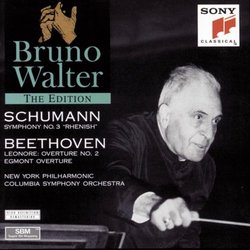| All Artists: Ludwig van Beethoven, Robert Schumann, Bruno Walter, Columbia Symphony Orchestra, New York Philharmonic Title: Schumann: Symphony No. 3 "Rhenish"; Beethoven: Egmont Overture; Leonore Overture No. 2 Members Wishing: 0 Total Copies: 0 Label: Sony Classical Release Date: 5/28/1996 Album Type: Original recording remastered Genre: Classical Styles: Forms & Genres, Theatrical, Incidental & Program Music, Historical Periods, Classical (c.1770-1830), Modern, 20th, & 21st Century, Symphonies Number of Discs: 1 SwapaCD Credits: 1 UPC: 074646448823 |
Search - Ludwig van Beethoven, Robert Schumann, Bruno Walter :: Schumann: Symphony No. 3 "Rhenish"; Beethoven: Egmont Overture; Leonore Overture No. 2
 | Ludwig van Beethoven, Robert Schumann, Bruno Walter Schumann: Symphony No. 3 "Rhenish"; Beethoven: Egmont Overture; Leonore Overture No. 2 Genre: Classical
|
Larger Image |
CD Details |
CD ReviewsWalter's youthful energy in 1940 Chung-Whun Chung | Seoul, Republic of Korea | 12/20/2000 (4 out of 5 stars) "Bruno Walter recorded rarely Schumann's works(especially symphonies). I think Schumann's orchestral works are not so good quality than other romantic composers. But some performers shows so nice interpretion. Walter's interpretion of 3th 'Rhenish' symphony has very vivid and youthful energy. It was recorded in 4 February 1940 at the New York(maybe studio recording). It was made by SP's direct disc recording probably, but sound is very good though some scratch noise. Blowing trumpets and thick and solid violoncellos and contrabasses testified Columbia's good recording technique. Walter indicated fast tempi in any movements-third movement like a 'lullaby', too. I think why not recorded complete cycle of Schumann's symphonies by Walter. Other recordings are Beethoven's two overtures-Egmont with New York Philharmonic and Leonore II with Columbia Symphony Orchestra. I think Egmont is good than Leonore II. I don't like Columbia Symphony's stereo recordings because they shows some disinclined images(But some recordings are best. For example, Mahler's 9th symphony)." A pleasant, if stingy, installment in the Walter Edition Santa Fe Listener | Santa Fe, NM USA | 12/17/2005 (3 out of 5 stars) "At 55 min. this isn't exactly a generous CD. The bulk of it is filled with a dimly recorded Schumann Rhenish Sym. from 1941 that is pleasant but not memorable. The NY Phil. plays a bit rggedly, the violins scrambling to meet Walter's mostly fast, at times slightly rushed tempos.
Two Beethoven overtures follow. The 1954 Egmont is very good. In contrast to Toscanini's roughly contemporary reading, which is manic and in edgy sound, Walter's is softly contoured, fairly fast but not rushed. The NY Phil. sounds alert and ready to play, even though the recording sounds a bit dull. The Leonore #2 Over. is in stereo from 1960 with the familiar Columbia Sym. Walter's relaxed, uninflected style is also familiar--note how little tension he builds up in the long adagio opening, and an overall timing of 15 min. indicates how slow the allegro is. The Szell and Klemperer accounts from the Sixties both find more drama. Overall, this CD poises between three and four stars, evoking no great enthusiasm or dislike." |

 Track Listings (7) - Disc #1
Track Listings (7) - Disc #1